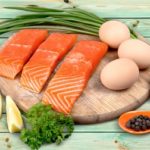 Once a rare disease, cancer is now widespread with statistics estimating that there will be 1,685,210 new cases of cancer in the US in 2016. The most common cancers are breast, lung, bronchial, prostate, colon, rectum, bladder, melanoma, non-Hodgkin lymphoma and thyroid cancer. Not wanting to go into the mortality rates in this post the fact remains that chances are high that we are, at some point, going to be effected by cancer, either ourselves or by someone we love. If you would like to know what you can do through nutrition to protect yourself against cancer, then read on.
Once a rare disease, cancer is now widespread with statistics estimating that there will be 1,685,210 new cases of cancer in the US in 2016. The most common cancers are breast, lung, bronchial, prostate, colon, rectum, bladder, melanoma, non-Hodgkin lymphoma and thyroid cancer. Not wanting to go into the mortality rates in this post the fact remains that chances are high that we are, at some point, going to be effected by cancer, either ourselves or by someone we love. If you would like to know what you can do through nutrition to protect yourself against cancer, then read on.
It is very interesting to note that the rise in cancer in the West has paralleled the rise in factory farming and the use of processed foods. Traditional diets contained animal and plant foods, farmed with nontoxic methods, many of whom rich in factors that protect against cancer. Let’s take a look at those nutrients in whole foods:
Vitamin A: Strengthens immune system and helps to detoxify. Found in cod liver oil, fish, shell fish, liver, butter and egg yolks from pasture-fed animals.
Vitamin B6: Contributes to the function of 100 enzymes. Most available from raw animal foods.
Vitamin B17: Found in a variety of organically grown grains, legumes, nuts and berries.
Vitamin D: Strongly protects against breast and colon cancer. Found only in animal foods, such as cod liver oil, lard, shellfish, butterfat, organ meats, egg yolks (from grass-fed animals). Also required for mineral absorption.
Vitamin E: Antioxidant at the cellular level. Found in unprocessed oils, butter and egg yolks.
Cholesterol: Potent antioxidant that protects against free radicals in cell membranes. Found in animal foods.
Minerals: Vital for protection against cancer. Most easily absorbed from animal sources.
Lactic acid and gut friendly bacteria: Keeps your digestive tract healthy. Found in old fashioned lacto-fermented foods and raw dairy.
Long-, and short chain fatty acids: Strengthens immune system and facilitates inter-cellular communication. Plentiful in coconut oil, butter, organ meats and seafood.
This list is by no means complete, however, these are the most important factors to consider. In the “C” word, Part II, we will look at the foods that do the opposite, the ones that you should avoid whenever possible.